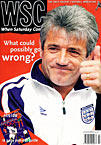 England played well, but the tournament as a whole was a disappointment, says Ken Gall
England played well, but the tournament as a whole was a disappointment, says Ken Gall
Euro 96 was, of course, the tournament of that song, and consequently provided a substantial contribution to the pension funds of Messrs Skinner and Baddiel. It also inspired, among other things, an execrable television drama starring the dreaded Neil Morrisey and a seemingly embalmed Des Lynam.
In spite of those outrages, the images of the tournament remain vivid for many: Gascoigne’s glorious goal against Scotland; Shearer and Sheringham carving open the Dutch defence; the tears of Southgate. But to a mind unclouded by false recollection, Euro 96 was a terrible old bore, characterised by shameless jingoism, half-empty stadiums and a seemingly endless succession of tedious draws and penalty shoot-outs. The tournament appeared to consist of teams that couldn’t score (Turkey, Scotland), teams that couldn’t play (Switzerland, Bulgaria), teams that flattered to deceive (Italy, Portugal) and teams that palpably did not want to be there (France, Holland).
Both semi-finals and two of the quarter-finals – six games which produced, in total, six goals – were decided by penalties, and only the lumbering Bierhoff’s golden goal spared us another so-called “nail-biter” in the final. Even the Czech Republic’s march to the final seemed to produce little in the way of romance or affection, rather like Tranmere’s Worthington Cup run this season.
In addition, the Football Association’s rose-tinted view that the “hooligan-free” experience of Euro 96 should be used as a basis for England’s 2006 World Cup bid stands at odds with the memory of the demolition of Trafalgar Square, the stabbing of an unsuspecting Russian student in Brighton and the targeting of German-made vehicles in central London following the semi-final.
The lack of backsides on seats for many of the ties – explained by either a) inept organisation or b) total public apathy towards anything not involving Tel’s Brave Boys – should be compared with France 98. Tunisia v Romania filled the Stade de France; can anyone imagine a similar encounter doing the same at Wembley?
England fans tend to look back on the tournament with a wistful, yet affectionate, sense of what might have been. Objectively, however, the whole thing was a disaster for England. Euro 96 provided them with the best opportunity to win an international tournament and, by doing so, lift the burden placed inadvertently on every subsequent England XI by Sir Alf, Sir Geoff, Sir Bobby and the rest.
The tournament was set up for the hosts. There was no exceptional opposition. Each game was played at a partisan and sold-out Wembley. The team was led by Alan Shearer, perhaps the best international striker in the world at the time. They had a bit of luck here (McAllister’s missed penalty) and a dodgy decision there (the ruling out of Salinas’s perfectly valid goal in the quarter-final). And still they didn’t win.
To foreigners living in England, the mentality of the football public and media can be bewildering at times. Terry Venables fails to lead a relatively strong host nation even as far as the final of a mundane competition that they really should win, and walks away from the England job as something approaching a national folk hero. By contrast, Bobby Robson leads England to the last eight of one World Cup and the semi-finals of the next and everybody can hardly wait to see the back of him.
Of course, it is England’s game against Holland that tends to have even the most notorious In-ger-lund headbanger reaching for the hankies. Arguably, this was England’s finest performance in the latter stages of a tournament since 1966; a genuinely convincing victory over one of the world’s top footballing nations.
Yet it cannot be forgotten that the entire Dutch squad appeared to spend the entire tournament collectively throwing toys of out of the pram, with coaches arguing with players, black players arguing with whites and young players arguing with their seniors. The atmosphere was hardly conducive to success in a major tournament, and their lame submission to France in the next round suggested that, just perhaps, their hearts may not have been entirely in it.
And, of course, all the thumpings of Holland in the world do not equate to actually going home with the trophy. Germany did not outplay Italy or England, the two quality opponents they faced; they huffed and puffed in the final against the Czechs. Indeed, their football throughout the competition hardly set the heather on fire.
Yet, at the end, it was the Germans who had the cheesy grins and the lap of honour, while England were left with the Pizza Hut advertisements and the hard-luck story.
From WSC 161 July 2000. What was happening this month
Only an Englishman would describe Euro 96 as a disaster for England. Or make excuses for beating the Netherlands 4-1.